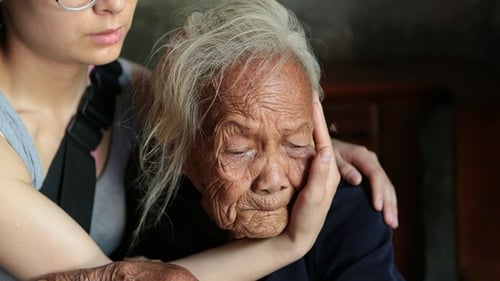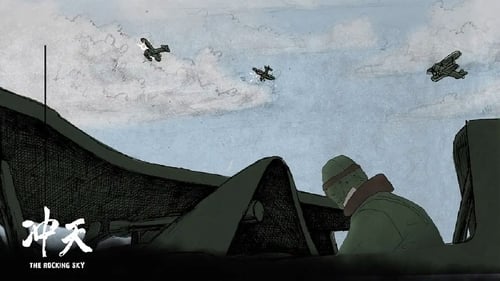A MONOLOGUE ABOUT HOME (2022)
Genre :
Runtime : 12M
Director : Yannan JIA
Synopsis
After the outbreak of the war in Ukraine, I reached out for a Ukrainian who studies in Beijing. Born in Russia, his father was Russian and his mother is Ukrainian. As the war escalates, his hometown was also bombarded, and his family breaks apart while his mom seeks for asylum in Bulgaria and his stepdad staying at home. He is about to leave China, feeling lost about his next destination. Gradually Mark and I have more resonance. And the pain caused by war started to strike me too.

Filmed over three years on China’s railways, The Iron Ministry traces the vast interiors of a country on the move: flesh and metal, clangs and squeals, light and dark, and language and gesture. Scores of rail journeys come together into one, capturing the thrills and anxieties of social and technological transformation. The Iron Ministry immerses audiences in fleeting relationships and uneasy encounters between humans and machines on what will soon be the world’s largest railway network.

A policeman investigates an introverted signal-station manager suspected of raping a hotel clerk.

A soon-to-be first-time voter, the filmmaker’s thought-provoking journey into the Rust Belt and South captures four Asian American voters’ ardent first time grassroots political participation ignited by the 2016 rise of “Chinese Americans for Trump.” FIRST VOTE is a character driven cinema verité style film chronicling the democratic participation of four Asian American voters from 2016 through the 2018 midterm elections.

A shy boy, who was not good at communicating with others, saw a shining fish in a stream one day and took it home. Since then, his life has changed. The lonely little boy was getting vivacious because of the little fish. But suddenly one morning when he got up, the fish disappeared...

Hong Kong, at the height of the protests. A young woman visits her father, whom she has not seen for a while. Her plan is to have lunch with him before the Umbrella Movement reaches a critical juncture. Celebrated, committed filmmaker Ying Liang contributed with a beautiful moving short with an special angle asking: Where do we live, and what is citizenship?

Coming back to her broken family, pregnant writer Huang Xiaoyu and her French husband, Benjamin, finds herself trapped between her cult brainwashed mother, Li Jiumei, and her secretly homosexual father, Huang Tao.

The "Great Sichuan Earthquake" took place at 14:28 on May 12, 2008. In the days after, ordinary people salvage destroyed pig farms in the mountains, collect cheap scrapped metals, or pillaging other victims' homes. Behind the media circus of official visits is an inconsolable grief of families searching for loved ones. As the Lunar New Year approaches, vagabonds and family tell of the ill-handling of rebuilding schemes and misuse relief funds. As they prepare for another visit from a high official, the refugees are swept out of the town and into tent cities. The promise to put a roof over their heads before winter seems impossible to keep.

The work was shot in Chongqing where Yu Guo lives. The artist utilises a camera with 8000mm digital zoom to capture the farthest objects that lens could reach. Because of the refraction of air and the limit of distance, the images that taken from kilometres away becomes blurred. Yu Guo continually adjusts the focal length in the process of shooting. Then, these unclear and ambiguous objects are inserted into the original or different video clips by re-editing or a collaging way. Through the misplacement of vision and the transformation of context, the original information and reference split in the images. Yu Guo attempts to interrogate the physical distance between himself and object, the relationship between subject and object in the video, and then re-examine the individual relationship and psychological distance in real life.

Follow the lives of the elderly survivors who were forced into sex slavery as “Comfort Women” by the Japanese during World War II. At the time of filming, only 22 of these women were still alive to tell their story. Through their own personal histories and perspectives, they tell a tale that should never be forgotten to generations unaware of the brutalization that occurred.

If It’s Not Now, Then When? mostly takes place in an apartment inhabited by three members of a family (though never at the same time): mother Pearlly Chua (from Tsai Ming-liang’s I Don’t Want to Sleep Alone), daughter Tan Bee Hung and young son Kenny Gan. Their father seems recently to have died. The mother leaves early and returns late, out on long walks in the park with a lover whom the daughter and her best friend try to spy on. The daughter pecks away at a computer at work and has a desultory affair with her married boss, which he carries on between his business and family phone calls. And the son breaks into cars and “recycles” the electronics he finds.

Xiayao Village, Youyu County, Shanxi ProvinceThe 7-year-old and big-footed Bai Nu and Liu Buhan, both of whom died because of their loved ones, were brought together with their three children more than 40 years ago. (Bai Danu 2 Men 1 Women) (Liu Buhan 3 (Daughter) Nowadays, the children have become grandparents, and most of them are not next to Bai Bainu and Liu Buhan. The children of both sides have differences over the old age of raising the two elderly people ... so despite the two They are all in their eighties, and still need to get up and return to the field to farm in the morning and night, and the old lady Bai is more because of her little feet, she has to stagger in the wind and rain, kneeling in the fields ... A foot-binding old lady faces the camera and talks to her little feet ...

To commemorate the 70th anniversary of the victory of WWII, this documentary film describes the eight years of dauntless air-force fighting of the republic of China during the Anti-Japanese War, with only 300 combat-capable aircraft from China while Japan had over 2000.

Gentle, easy-going Or Kia moves from the countryside to Kuala Lumpur to work for his cousin and best friend Ah Soon, a mid-level gangster and enforcer. While Or Kia works hard to put a sister through school, Ah Soon cares for an unstable girlfriend prone to mysterious disappearances. As they both sink deeper into a nocturnal world of debts, drugs, and betrayal, Or Kia's loyalties are strained when Ah Soon falls out of favor with the bosses and tries to escape the business.

The core of the work is to explore and experiment the viewing mechanism of the image. Try to recreate the third space with the characteristic of "halo" through images. The halo points to ambiguity and a sense of distance, while the third space is the difference space constructed by reality and consciousness. The work uses fragments of daily life and poetic non-linear narrative as two narrative means, interspersing and advancing the narrative, which corresponds to the two viewing states of the audience, namely reverie and trance, and hopes to connect the audience with the image in the form of flowing water.

This is a documentary about the father of a miner. In 1955, more than 300 young people from Shanghai came to Sanlidong Coal Mine in Tongchuan City, Shanxi Province with the hope and dream of supporting the construction of the Northwest. After 50 years, most of the builders of that year were gone. In the land where black coal is buried, the fate and breathing of the miners are always stirring. The film uses 15 clips to record the old miners, the deceased and the era that is still living in the area, witnessing the tenacity and dignity of life with a group of miners. They are: Shu Guoqi, Gu Longxiang, Shen Longgen, Wang Zhengxiang, Yao Hongchang, Ge Dengfa, Zhang Baisheng, Lu Rongchu, Zhou Shougen, Luo Shijun, Ding Fuzhen, Tong Guang, Gao Zhangshun, Chen Yixiang, Zhu Yongsheng.

Xingxi travels alone to Alor Setar, a town in Northern Malaysia. As a consequence of a blown tire, she experiences three variant adventures. She introduces herself to people using different identities with mysterious secrets. In return, what the journey brings her is thoroughly unexpected. In the first adventure, Brooke is a traveler; in the second adventure, Brooke is an anthropologist; in the third, Brooke is a divorcée. She is a disheartened woman who comes across a French writer named Pierre. The two lonely travelers become instant friends. Their age gap enables them to have their respective insights into life and death. Meanwhile, it is not until the enigmatic side of Alor Setar begins to unfold that Brooke tells Pierre the true reason why she has come. They seek to understand the interaction between love and life. As the story comes to an end, mother nature shows her beauty with the magical Blue Tears phenomenon on prominent display.

Xuan is a young man working in the film industry in Beijing. To make a documentary film that he wants to present at international festivals, he decides to take advantage of the holidays of the Day of the Dead to return to Chengdu, his hometown located at the other end of the country. The documentary he is about to make is about his relationship with his own lover. He leaves for Chengdu, accompanied by another man, Bo, the cameraman of the film. The two men take the train to Chengdu where Hong, Xuan's lover, is waiting for them. From the first moment of their arrival at the station, Xuan and Bo begin to turn with their camera, Xuan having already explained to Bo what he wanted to film and that Hong would always be "playing", Bo then trusting in Xuan. But Hong is more and more opposed to this camera and the presence of Bo.

The movie follows two unfortunate secret lovers who are constantly looking for a solution to their situation. Both of them are always arguing over their relationship. One day they went to a trip out of the city, into the outskirt. They hope they can solve their problems or at least escape them temporarily. They don’t have a solution, and they don’t understand why they are together. One thing that keeps them together is their love and care for each other. This is the second part of James Lee’s Love Trilogy which takes another look at unfaithfulness or rather faithlessness.

The little-known Hunan Suining County is an ordinary but full of magical places. As the theoretical point of the rocket wreckage launched by the Xichang Satellite Launch Center, it has greeted the rocket wreckage from the sky dozens of times in the past 20 years since 1990. This mysterious and dangerous “out-of-town visitor” broke the poor and peaceful life of the 160,000 locals in the jurisdiction. 2008 is China's "Olympic Year" and "Aerospace Year." The people of Suining, like the people of the whole country, are looking forward to the Olympics to pay attention to the Olympics and are proud of the growing strength of the comprehensive national strength including aerospace strength. They also have to bear the fate of falling from the sky.









